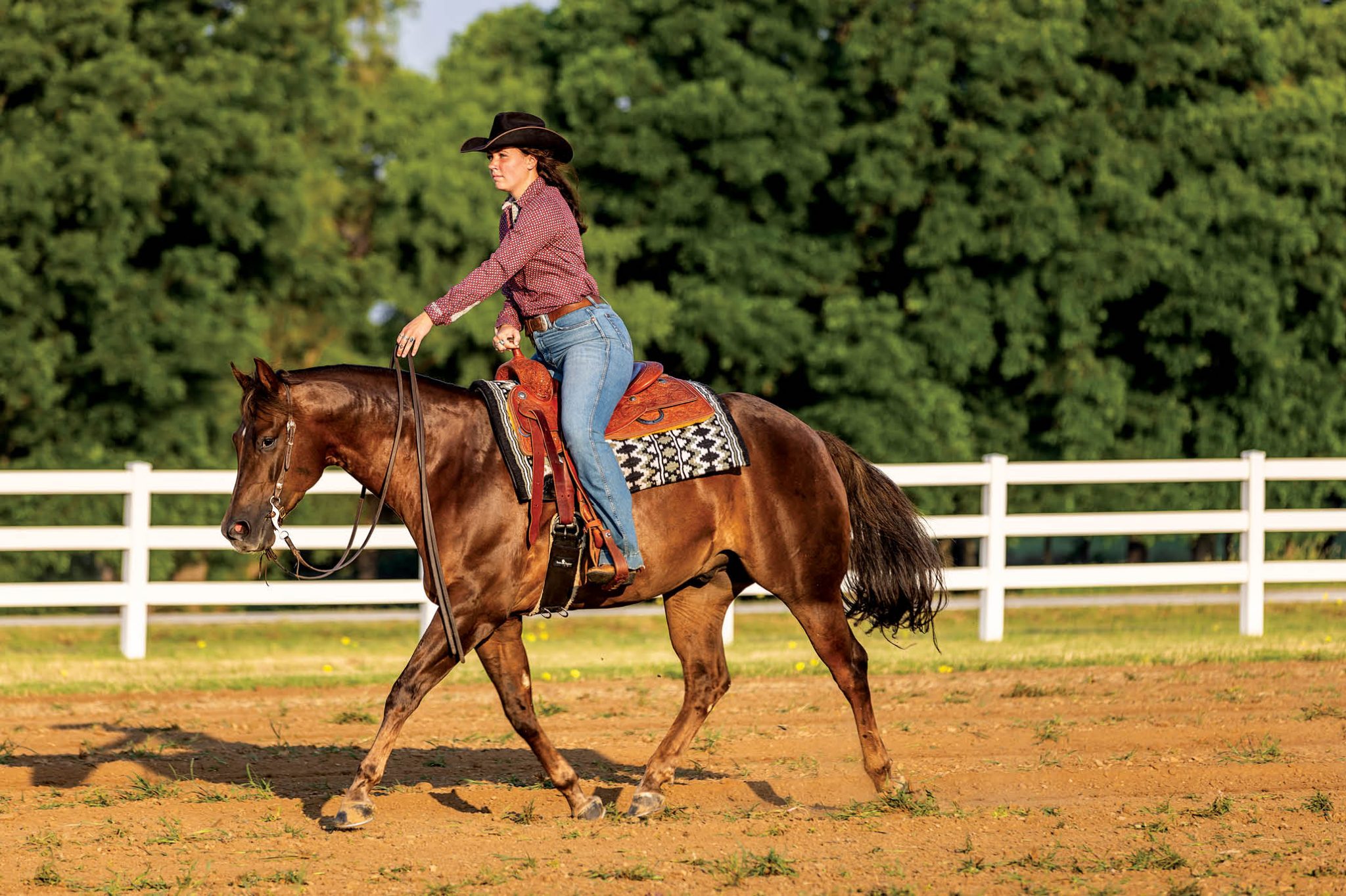My philosophy toward competition is to stay positive as much as we can because we tend to sabotage ourselves. We’re hard enough on ourselves as it is. So finding good things about our riding, using mental exercises that will keep us in a positive place, and having a mental game plan are all important. It’s just as key for us as riders to have a mental game plan for ourselves and our horses, as it is to have a plan for how we’ll physically prepare our horses to show.
Slow It Down
Performance events such as reining and cow horse are very fast-paced. Something I’ve found helpful for riders in these disciplines is trying out ranch riding. The ranch riding is slowed down a gear, and you purposely want to take your time in some places. You don’t want to rush.
So going into an arena to show in ranch riding, you can see how you can mentally slow down and not be in a hurry. I’ve found that makes you a better reiner and cow horse competitor because you learn how to be more patient, think through each maneuver, and separate the maneuvers as well.

Handle Errors
If something goes wrong, learning to mentally tell yourself ‘that maneuver is done, I’m not going to dwell on the mistake we made’ and being able to move on to the next one is key.
Often, an open competitor can mark two points higher on a non-pro horse than the non-pro can. Why is that? It’s because when a non-pro rider performs a stop, and they have a -1 score on that stop, they start to focus more on that stop instead of planning for the next two stops.
If I run down to the stop on your horse the first time and he stops a -1, I roll back and in my head I’m thinking about my offensive plan of how to stop that horse a +1 the next time. I am not still thinking about the -1 one we just did.
Build Confidence
Remind yourself not to think negatively. When you’re setting up your game plan, don’t tell yourself what you’re not going to do, or what you should not do. Talk to yourself about what you should do.
In a reining pattern, we tend to walk to the center of the arena, and we’re going to lope off to the right. Sometimes that horse picks up the wrong lead, or leans his shoulders in, or pokes his nose out. So you might walk to the middle and think ‘Oh, I hope he doesn’t poke his nose out. I hope I get the right lead.’ That’s a bad mental perspective.
Instead, you should be saying, ‘I’m going to walk to the middle, and these are the things I’m going to do to set my horse up so that we lope off in the correct lead to do that. My leg needs to be here, my hands need to be here, my weight needs to be here. I’ve got to be looking up and I’ve got to be thinking about how to drive this thing in an offensive way, not playing defense.’
Have a Game Plan
Every self-help book out there is going to tell you to be positive and do mental visualization. A lot of times they’re talking about a golfer or a tennis player who does an individual sport, but they don’t have another animal involved. However, you can translate that and envision having a perfect ride on your horse.
It’s good to visualize the perfect pattern and run through it. But because you know the horse is going to make decisions you might not want; you need to think about how you’re going to deal with that. Envision the pattern when it does go wrong, and then envision how you’re going to fix it. Especially if you’ve got a horse that has a particular problem. If you map it out how you’re going to deal with it, then when it does happen, you’ve practiced and thought it through.

Draw From Your Good Memories
Sometimes when preparing to show your horse, you feel mentally ready to go win. There are other times where you feel like your horse woke up on the wrong side of the stall that morning. Or maybe your emotions toward your horse aren’t what they should be. You could also be mentally distracted with something else happening. We know that if our brains are not where they’re supposed to be, we’ve got to mentally change gears.
Think back to a time where you had a good experience and connect to it. For some people, it’s thinking about chewing a certain flavor of gum, or a moment in their life they can replay back, or even hearing a certain song.
Don’t Try Too Hard
A lot of athletes prepare by listening to music to help them set their mental mindset. Some of us have to push ourselves to get warmed up and aggressive. Some of us need to learn how to settle down and not try too hard. Trying too hard can get you in the penalty box just as quickly as not trying hard enough. But if you ask your horse for too much in the show pen, he can get confused, or even frustrated with what you’re trying to do.
Build a Team
So how can you switch from riding defensively and fearfully at a show, when you ride confidently at home? You’ve got to have a good team around you that can offer support. Whether that’s a couple of barn friends who enjoy going to horse shows together and supporting each other. Or riding with a trainer who is a good coach and can help with your mental game. It’s not only the mechanics of what the horse is doing, but also being mentally prepared and offering words that can calm you down or build you up.

